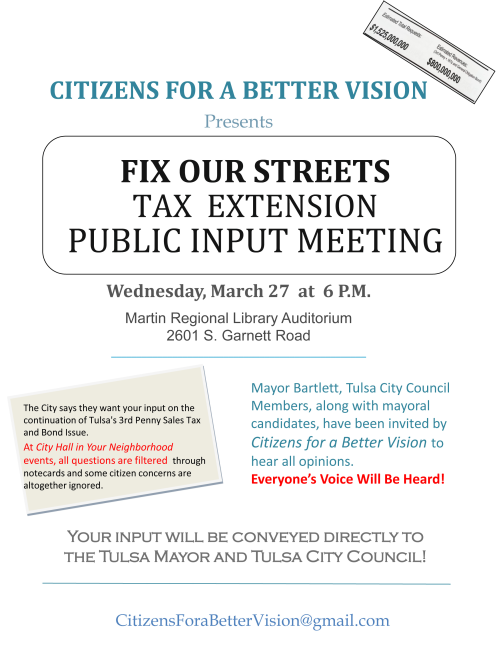Fix Our Streets tax extension public input meeting tonight
Citizens for a Better Vision was the grassroots group that led the successful opposition to Vision2, using a minuscule budget compared to the millions at the "vote yes" side's proposal. Now they're trying to influence the development of proposals to re-up city sales and property taxes for a new funding package for city infrastructure, a combined package that may top $800 million, with hopes that the ultimate proposal is one worthy of the voters' support.
Tonight, Wednesday, March 27, 2013, at 6 p.m., at the Martin East Regional Library, 2601 S. Garnett in Tulsa, Citizens for a Better Vision will host a meeting to allow the public to express their concerns and air their comments on the developing proposal to extend the City of Tulsa sales taxes (1 1/6 cent) and general obligation bond issue that have been devoted for the last few years to street repair. All mayoral candidates and all members of the City Council have been invited to attend the meeting.
There have been City Hall sponsored meetings ("City Hall in Your Neighborhood"), but, according to the Citizens for a Better Vision flyer, "all questions [at the official City Hall-sponsored meetings] are filtered through notecards and some citizen concerns are altogether ignored." In contrast, the flyer for tonight's meeting promises that "Everyone's Voice Will Be Heard!"

This meeting is a great opportunity to express your "must haves" and "dealbreakers" to the mayor and council, who must approve any package that goes before the voters. Here are a few of my requirements that have to be met before I'd support a funding package.
1. Streets only: No corporate welfare, no unfulfilled wishes from Vision2, only the construction and maintenance of streets. Anything else would have to be on a separate ballot item, preferably not even on the same ballot or the same day.
2. No permanent taxes: No more than a five year term before the tax sunsets.
3. A "Brown ordinance" with teeth: A clear and complete list of projects to be funded, with an estimated cost for each, and a basis for estimate for the cost of each. (The Brown ordinance was a key element in the passage of the first 3rd Penny sales tax in 1980, after a blank check tax was defeated by voters the previous year.)
4. Pay-as-you-go: No borrowing money against future sales tax revenues to fund current projects. By keeping it pay-as-you-go, all the money goes to projects, instead of bond fees and interest.
What are your dealbreakers for a new streets package? List some in the comments below.
0 TrackBacks
Listed below are links to blogs that reference this entry: Fix Our Streets tax extension public input meeting tonight.
TrackBack URL for this entry: https://www.batesline.com/cgi-bin/mt/mt-tb.cgi/6794
What is wrong with borrowing against future sales tax revenues to pay for long-lasting street improvements? "Pay as you go" for capital improvements doesn't necessarily make any more sense in government than it does in a household budget.
Even fiscally conservative households borrow money to buy long-lasting assets like houses and cars. Householders don't say: "We're going to keep renting this junky trailer and driving the unreliable jalopy until we save up enough money to pay cash for something better."
Insistence on "pay as you go" is a recipe for enduring crumbling infrastructure into the indefinite future. And crumbling infrastructure will continue to be a drag on Tulsa's economic growth.
Besides - if streets are built with future tax revenues, they will be paid for by the people who actually will be driving on them!
"What are your dealbreakers for a new streets package? List some in the comments below."
Why the emphasis on dealBREAKERS?
We shouldn't let the perfect be the enemy of the good.
If borrowing were free, then there wouldn't be a problem, but revenue bonds mean that dollars you would have had for projects go instead to pay bond interest and fees. OKC did MAPS on a pay-as-you-go basis, and Tulsa's 3rd penny packages were pay-as-you-go until the 2009 streets package.
I don't think it's a crippling limitation. Drivers can only deal with so many simultaneous street projects, and too many projects at once can driving up project cost as the demand for street contractors outpaces supply.
As for dealbreakers, politicians have a habit of logrolling pet projects of dubious value in with popular, necessary projects. If we let city leaders know now what add-ons would keep us from voting yes, they can eliminate the dealbreakers and craft a package that could win 80% of the vote. That's a more sensible strategy than loading a package with pork and then running a million-dollar vote yes campaign to try to scrape by with a hair more than 50% of the vote.
"If borrowing were free, then there wouldn't be a problem..."
Of course borrowing isn't free. Nothing is free. But in this market interest rates are at historic lows, and borrowing is about as close to free as you can get. When you run the numbers, the borrowing costs would be a miniscule part of the total package.
Not only would borrowing enhance our quality of life by allowing Tulsans to enjoy the improvements sooner, but the improved infrastructure is likely to generate business activity that would improve our overall economic climate.
Not to mention that the funds spent on the improvements would circulate back through the economy, generating still more sales tax revenue with which to pay off the bonds. (And pay off those worrisome but miniscule borrowing costs.)
Finally, let's not forget all the unnecessary wear and tear on our cars that goes on while we postpone street improvements because we don't like to pay any interest. That's penny wise and pound foolish.